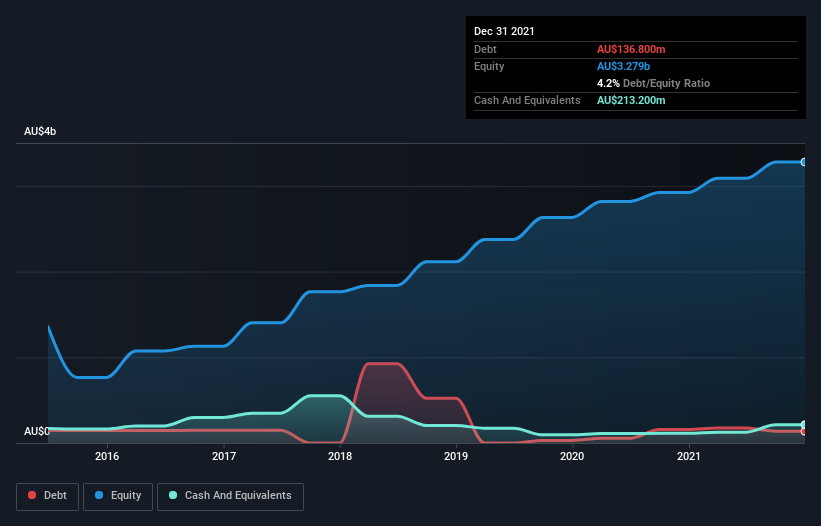These 4 Measures Indicate That Beach Energy (ASX:BPT) Is Using Debt Reasonably Well
Howard Marks put it nicely when he said that, rather than worrying about share price volatility, 'The possibility of permanent loss is the risk I worry about... and every practical investor I know worries about.' So it might be obvious that you need to consider debt, when you think about how risky any given stock is, because too much debt can sink a company. We can see that Beach Energy Limited (ASX:BPT) does use debt in its business. But is this debt a concern to shareholders?
Why Does Debt Bring Risk?
Debt and other liabilities become risky for a business when it cannot easily fulfill those obligations, either with free cash flow or by raising capital at an attractive price. In the worst case scenario, a company can go bankrupt if it cannot pay its creditors. While that is not too common, we often do see indebted companies permanently diluting shareholders because lenders force them to raise capital at a distressed price. Of course, plenty of companies use debt to fund growth, without any negative consequences. The first thing to do when considering how much debt a business uses is to look at its cash and debt together.
Check out our latest analysis for Beach Energy
How Much Debt Does Beach Energy Carry?
You can click the graphic below for the historical numbers, but it shows that Beach Energy had AU$136.8m of debt in December 2021, down from AU$158.0m, one year before. But it also has AU$213.2m in cash to offset that, meaning it has AU$76.4m net cash.
A Look At Beach Energy's Liabilities
The latest balance sheet data shows that Beach Energy had liabilities of AU$425.9m due within a year, and liabilities of AU$1.19b falling due after that. Offsetting these obligations, it had cash of AU$213.2m as well as receivables valued at AU$224.7m due within 12 months. So its liabilities total AU$1.17b more than the combination of its cash and short-term receivables.
While this might seem like a lot, it is not so bad since Beach Energy has a market capitalization of AU$3.65b, and so it could probably strengthen its balance sheet by raising capital if it needed to. But we definitely want to keep our eyes open to indications that its debt is bringing too much risk. Despite its noteworthy liabilities, Beach Energy boasts net cash, so it's fair to say it does not have a heavy debt load!
Also positive, Beach Energy grew its EBIT by 23% in the last year, and that should make it easier to pay down debt, going forward. The balance sheet is clearly the area to focus on when you are analysing debt. But ultimately the future profitability of the business will decide if Beach Energy can strengthen its balance sheet over time. So if you want to see what the professionals think, you might find this free report on analyst profit forecasts to be interesting.
Finally, while the tax-man may adore accounting profits, lenders only accept cold hard cash. While Beach Energy has net cash on its balance sheet, it's still worth taking a look at its ability to convert earnings before interest and tax (EBIT) to free cash flow, to help us understand how quickly it is building (or eroding) that cash balance. In the last three years, Beach Energy's free cash flow amounted to 27% of its EBIT, less than we'd expect. That weak cash conversion makes it more difficult to handle indebtedness.
Summing up
While Beach Energy does have more liabilities than liquid assets, it also has net cash of AU$76.4m. And we liked the look of last year's 23% year-on-year EBIT growth. So we are not troubled with Beach Energy's debt use. Of course, we wouldn't say no to the extra confidence that we'd gain if we knew that Beach Energy insiders have been buying shares: if you're on the same wavelength, you can find out if insiders are buying by clicking this link.
If you're interested in investing in businesses that can grow profits without the burden of debt, then check out this free list of growing businesses that have net cash on the balance sheet.
Have feedback on this article? Concerned about the content? Get in touch with us directly. Alternatively, email editorial-team (at) simplywallst.com.
This article by Simply Wall St is general in nature. We provide commentary based on historical data and analyst forecasts only using an unbiased methodology and our articles are not intended to be financial advice. It does not constitute a recommendation to buy or sell any stock, and does not take account of your objectives, or your financial situation. We aim to bring you long-term focused analysis driven by fundamental data. Note that our analysis may not factor in the latest price-sensitive company announcements or qualitative material. Simply Wall St has no position in any stocks mentioned.

 Yahoo Finance
Yahoo Finance 
